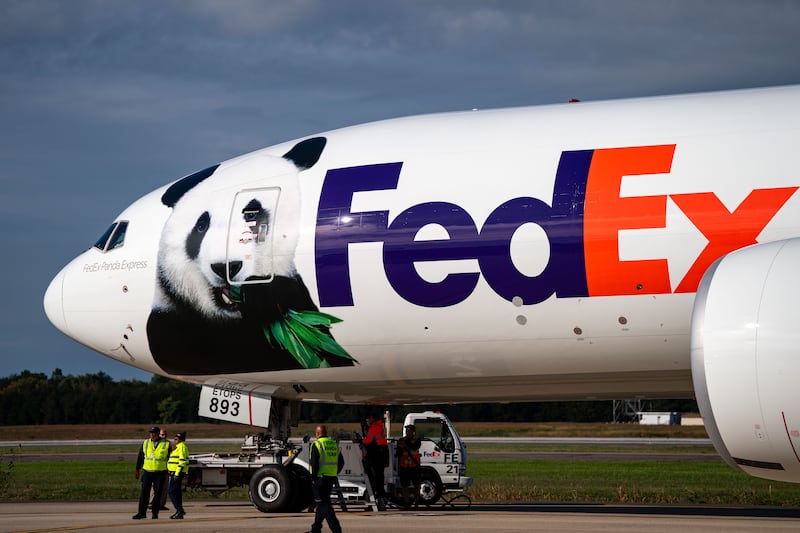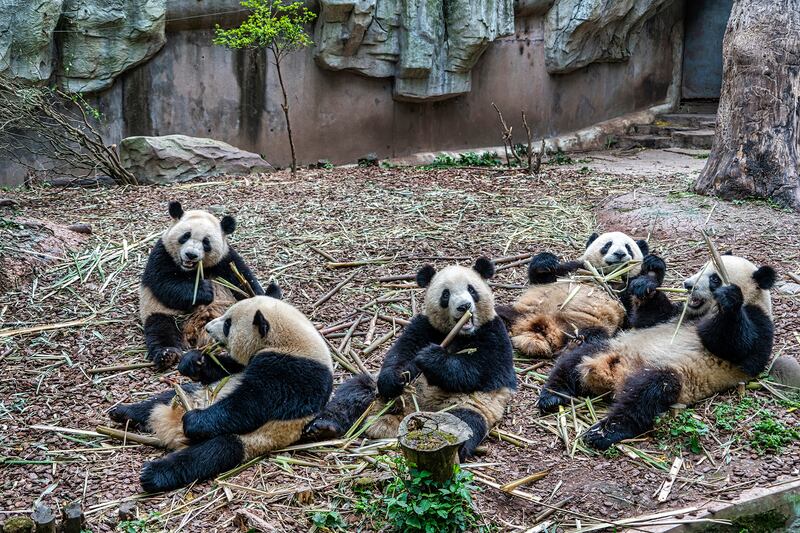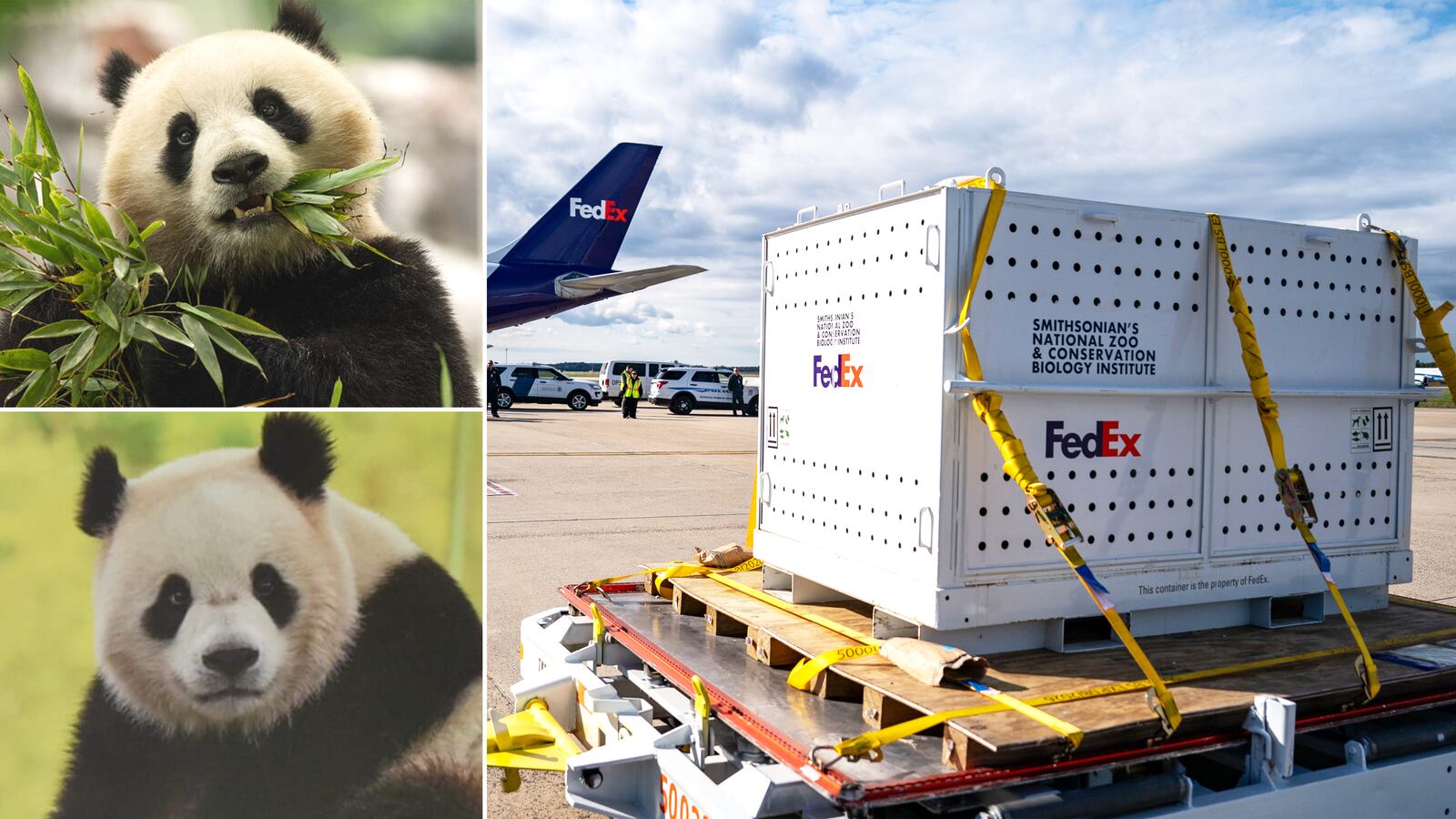Washington welcomed two new VIPs—very important pandas Qing Bao and Bao Li— to the National Zoo Tuesday under the shadow of stunning new allegations that China has exploited the renowned panda-lending program for its own gain.
The three-year-old bears arrived from China aboard a special FedEx “Panda Express” plane, jetting 8,000 miles from Chengdu to D.C. to be welcomed as the newest celebs in the zoo’s storied 52-year-old panda program.
“It’s been a long year without pandas,” Laurie Thompson, a veteran panda keeper at the zoo who was part of a team that traveled with the bears, told The Washington Post. “We’re excited to see the new guys, and we’ll fall in love with them just like before.”

A pair of giant pandas, Bao Li and Qing Bao, arrive on a FedEx Boeing 777 plane from China at Dulles International Airport.
Kent Nishimura/Getty ImagesThe pandas’ arrival was shrouded in semi-secrecy as the zoo closed its gates Tuesday to give the new residents time to settle into their multimillion-dollar, freshly-renovated home.
The bears will be quarantined for at least 30 days and their highly anticipated public debut is scheduled for January 24, just days after the presidential inauguration.
Though the new pandas are here on what’s believed to be a 10-year lease with a $10 million price tag, the cozy arrangement is not without controversy.
A new investigation by The New York Times published Tuesday painted a disturbing picture of China’s so-called panda diplomacy and conservation efforts.
The Times reported that China began sending pandas to foreign zoos in the 1990s for breeding, "in the hope that future generations could be released into nature. It hasn't gone as planned."
“From the beginning,” The Times said, “zoos saw panda cubs as a pathway to visitors, prestige and merchandise sales. On that, they have succeeded. Today, China has removed more pandas from the wild than it has freed.”
The Times investigation, based on 10,000 pages of records, highlighted that while panda cubs born in captivity bring attention to zoos, none has ever been released into the wild. It further questioned China’s claims about the number of wild pandas, suggesting that the figures may be politically inflated.

The new arrivals are among the four pandas in the U.S. as part of the exchange program with China.
Getty ImagesThe Times also exposed the darker side of artificial breeding programs, detailing how insemination efforts have, at times, harmed individual animals, with at least one panda dying from the process and others suffering injuries. Some pandas were even kept partially awake during painful procedures, a practice experts say exceeds recommended medical protocols.
Annalisa Meyer, a spokesperson for the National Zoo, defended the program, telling the Times that that zoo pandas serve as “insurance against extinction.” She acknowledged that efforts to release pandas into the wild remain in the early stages, adding that animal welfare remains a top priority for the zoo and its Chinese partners.
Bao Li ("precious vigor" in Mandarin) and Qing Bao ("green treasure") arrive in D.C. with high-profile family ties to previous participants in the program. Bao Li, the energetic male, is the son of Bao Bao, born at the National Zoo in 2013, and the grandson of Mei Xiang and Tian Tian, who returned to China in November 2023 with their cub, Xiao Qi Ji.
Currently, only two other pandas remain in the U.S. at the San Diego Zoo, while four pandas from Zoo Atlanta were returned to China last week.
Worldwide, researchers estimate there are around 1,860 pandas in the wild and around 700 in zoos and breeding centers. The animals are no longer considered “endangered” but are still listed as “vulnerable” to extinction.
As an intern in the Los Angeles Times Washington Bureau, Ben Sherwood wrote about pandamania in the summer of 1982 when Ling Ling and Hsing Hsing tried to have a baby through artificial insemination. Over the next 20 years and under the spotlight, Ling Ling gave birth to five cubs but none survived more than a few days






